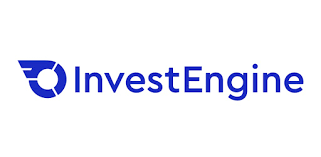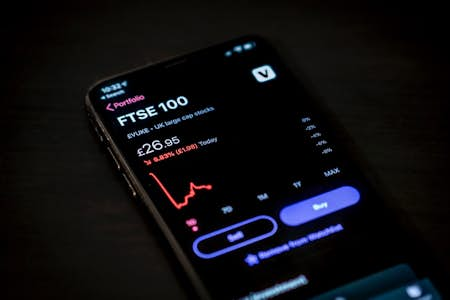Trading apps have become increasingly popular in recent years. As a result, there are now countless platforms to trade stocks through, making running a portfolio on the go possible without the need for five computer terminals with Bloomberg access.
However, therein lies a problem. If you are not a fund manager with numerous years of experience in trading stocks, what trading app is best for you? And what exactly makes a good stock trading app?
Knowing the answer to these questions is crucial to getting the very best app for your needs and requirements. Everyone will trade differently and for different purposes, which is why there is demand for so many trading apps.
Remember to consider your financial circumstances when deciding which app to use. After reading this guide, you may think that passive investing is the best approach.
Discover the UK's leading investment platforms, whatever your investment goals. Click on a provider below to get started!
What is a stock trading app?
A stock trading app is an app that facilitates stock trades. However, they can vary greatly. Some trading apps will only run on a mobile app, for example. In contrast, others will only be accessible through a desktop computer. Other stock trading apps allow you to efficiently run a multi-asset portfolio and keep you updated on your investments through notifications. In contrast, some will enable you to trade stocks only.
What to look for in a stock trading app
When choosing the best stock trading app for you, remember to consider the following factors and how they impact your investment abilities.
Fee structure
No trading platform seems to charge fees or commissions the same way as another. Yet, while it may be time-consuming to get to the bottom of how a trading platform structures its prices, it is necessary.
Many trading platforms will try to hook you in under the guise that they have the lowest fees. Some will say they offer commission-free trading; others say they have the narrowest spreads, while others say they provide a certain amount of free trades a month.
But remember, there is no such thing as a free lunch when it comes to trading. Even if a company offers you free stock to put into retail investor accounts, you'll be paying for that in some way, somewhere down the line.
Some trading platform fees will work better for you and come out more cost-effective than other platforms that may look cheaper at a headline rate. If you are a high-frequency trader, using a company that gives you a certain amount of free trades a month may keep your trading costs down. Or, it could be that a firm does not charge commission on each transaction, keeping your fee charges as low as possible.
Bear in mind that low fees do not necessarily mean that you should pick that particular app. Online trading costs can quickly add up and eat into your returns. However, if a more expensive app provides you with charting tools that enable you to make better returns, you will make more money - which is the fundamental aim.
Interface
Something that makes a big difference to how good a trading app is is how effectively you can use it.
You will find some trading apps intuitive to use, while others may be a bit clunky. However, the user experience may well reflect in the prices or fees an app charges. Sometimes, you may conclude that using a slightly more cumbersome app is worth it. Or, you could find that an app's design and interface are so poor that they negatively impact your ability to place well-timed trades.
Some trading apps allow you to play around with a demo account to see how you get on with the app's interface and software. If a trading app does offer you this, it can be worth seeing how easy it is to use so you know what you are signing up for before parting with any hard-earned cash.
Regulation
Depending on how risk-averse or risk-happy you are, the question of whether your trading platform is regulated or not may or may not be important to you. Regulation keeps you safe, but you may think a trading platform is so good that it is a risk worth taking if it isn't.
A typical regulator that many experienced investors like to see is the FCA (the UK's Financial Conduct Authority). However, CySec (the Cypriot regulator) is increasingly the regulator that online trading apps use.
Depending on your views of regulation, you may want to consider what specific regulators check for to give their accreditation. Just because a company has a regulator does not necessarily mean that that regulation makes you feel any safer.
If several global entities regulate your app, it may be able to operate in more markets and therefore offer a broader set of investment opportunities.
Research
Some trading platforms are a no-frills venture. Often, that means that little is available in the way of research to its users, which may or may not be a bad thing for you. For example, "free" research - which you're paying for somewhere - may be an unnecessary extra that you won't use to help your investigations into potential stock investments. Or, it could be that you think the expertise of a research department is something you need - and it could be worth paying that little bit more in terms of fees.
Also, be aware that research is not just providing educational resources to customers. While educational articles and videos are great, they are just an extension of a company's customer support department. An investment platform that explains what fractional shares are or what trading tools are available for share dealing is not providing in-house research on potential buys. These 'how tos' are undeniably useful, but they won't add much value to active traders for long.
Instead, research tools that help you analyse potential investments can be a place where you derive value from your chosen app. For example, a stock trading app's research can be a way that you can get to know the latest goings-on at the London Stock Exchange. Or how political elections in Europe could affect your short term and long term returns within financial markets.
Asset classes
Remember to consider what asset classes you want to invest in across your portfolio. For example, if you only want to invest in stocks, some apps may be more suitable.
Alternatively, if you're going to invest in bonds, exchange-traded funds (ETFs), commodities, other alternative assets and Forex, it may be that you require a more comprehensive trading app where you can keep an eye on your portfolio from just one dashboard.
For example, if you want to trade currency pairs, you may wish to see MetaTrader4 offered through your app. However, that's not always automatically offered as standard, so be sure your trading account does what you need it to before you choose your potential trading app.
Alternatively, you may be happy to have several apps that specialise in specific asset classes. For example, you might decide to use Avatrade for Forex or CFD trading in addition to using a stock trading app.
Extra features
Sometimes, higher fees are reflected elsewhere in a trading app’s platform. However, extra features or functionality that help you become a better trader or investor can sometimes be worth paying for if you start seeing better returns.
Additional features can include powerful analytics tools, the ability to copy another investor's trades, or placing automatic buys or sells so you always achieve a price for a stock. However, these may not be features you end up using, so be sure you are not paying a premium for tools you don't need.
Deposit amounts
Some mobile trading apps and online brokerage firms have very low minimum deposits. That's crucial to know before you hand over your bank account details to start share trading or spread betting with a company.
While not all of the best stock trading apps UK wise will have a low minimum deposit, the ones that do open up the world of trading to novices. Those with very little knowledge compared to experienced traders can begin investing to take advantage of the benefits that the global markets can provide - with very little equity.
Payment methods
There are an increasing number of ways that you can transfer money into a brokerage account for a trading app.
The likelihood is that most will accept a debit card as a form of payment. However, you may want to pay with other financial instruments such as cryptocurrency, PayPal or even a credit card. Not all apps will accept every payment method, so be sure that you can make your first deposit in a way that works for you.
Mobile device
Not all trading apps are available for every operating system. While most apps will have both an Apple and an Android version, that is by no means a given. If you plan on using your iPhone or iPad to trade, ensure you check the App Store. Likewise, if you are an Android user, ensure you check the Google Play store before opening an account with a specific platform.
Customer service
Customer service may sound like an odd feature to be so crucial to a FinTech company. As a customer, you may believe that you never have to contact the company behind the app if the technology is good enough. However, while FinTech firms do everything they can to minimise your need to get in touch, there may still be times that you need to rectify a problem with human help.
Those problems could be anything from issues with account setup to the closing of a trade. Being able to speak to, email, or chat online with a customer support rep can make all the difference in those times. Trading is so often exceptionally time-sensitive that you will want to resolve issues quickly and easily. If a company's customer support team falls short, you may want to look elsewhere.
Top stock trading apps in the UK
The FCA regulates all of the below trading apps in the UK. As a result, they follow robust and stringent procedures to adhere to the requirements and regulations the FCA sets out to protect investors.
eToro
eToro is a trading platform with a difference. It has a social media slant to it, making it the Facebook of the stock trading app market.
In practice, that means you can follow a fellow trader and see what trades they are making. Then, if you like how they trade, their portfolio, and their returns, you can set up trades that automatically mirror and copy their trading positions. Of course, social trading is by no means an easy way to make returns. Still, it can open your eyes to new ways of day trading that may educate you on different order types, for example.
Another possible benefit to potential users is the ability to trade cryptocurrencies, an increasingly popular asset class. It is also possible to trade CFDs through eToro. However, these do pose a risk of significant losses should just one trade not go in the direction you anticipated.
Finally, eToro does not charge commission on stock or ETF trades and does not charge management, rollover or ticket fees. However, you may find that the spreads are not quite as attractive as other platforms.
Hargreaves Lansdown
Compared to eToro's almost Generation X approach to trading, Hargreaves Lansdown's trading app is a far more traditional way to trade stocks and shares. However, it is well designed, user-friendly, and intuitive for many to use right from the beginning.
Hargreaves Lansdown is one of the largest stockbrokers currently in operation in the UK. Yet interestingly, despite the number of customers it has, it still charges some comparatively high fees. Its stocks and ETF trading fees are pretty expensive if you do not frequently trade in any one month. However, if you make over 20 trades a month, your cost per trade will decrease considerably (from £12 to £6).
Finally, Hargreaves Lansdown does not charge deposit, withdrawal or inactivity fees, which can start to eat away at returns.
Plus500
While Plus500 markets itself as the UK’s no.1 CFD broker, that is by no means the only asset it trades.
For those looking to diversify their portfolio of stocks and shares by buying commodities and trading Forex, Plus500 offers the ability to do so all from one app. It is also possible to trade indices and ETFs for those who want to buy units in funds to gain exposure to a wide range of stocks without structuring an entire portfolio themselves. It is even possible to purchase units from the Cannabis Stock Index with Plus500.
Other attractions are its competitive spreads and fairly intuitive platform. There’s a lot of information that the app packs into a small space, but once you get used to it, it can be an easy to use platform even for beginners. Its customer service is said to be among the best in the business.
Capital.com
Capital.com is another trading app that advertises itself as a big CFD trading platform. However, it's still possible to trade traditional shares, too. Users often like it due to the fantastic customer support they receive. Help is available through email and chat support, so issues are usually resolved quickly - a great comfort if you want to act on a trade to make the most of an attractive stock price.
Additionally, account setup is often touted as a great experience with Capital.com. That can make all the difference to future dealings with the company, so it's great to see Capital.com has thoroughly addressed the process.
On the cost side of things, customers enjoy its low forex CFD fees and commission-free stock trades. As a result, you'll make better returns due to the low-cost structure.
However, Capital.com can have high stock index CFD fees, which is something to be aware of. Plus, if you have smaller currency pairs on your watchlists, Capital.com does not offer the widest selection of Forex pairings.
Overall, Capital.com has an easy to use interface that still manages to pack a punch. The real-time market data is simple to read, making it easier to interpret, understand, and decide what action you'll take.
Fidelity
Fidelity was a stalwart investment firm long before apps were a thing. Its mobile stock trading app allows you to run your investments with them through your fingertips. Their app is slick, easy to use and doesn't require a PhD in economics.
From the moment your account opens, you'll notice the company's years of experience come through onto your phone's screen. You have a secure login that is painless to set up and can also link your account to other family members' accounts. So, if you are looking for investments for your grandchildren or children, this could be a great option. Importantly, checking account valuations is swift.
In addition, you can create watchlists easily to research and track investment performance before taking the plunge into buying. This is not a particularly innovative feature, yet it is one that not all apps offer despite being incredibly useful. Fidelity also provides a customisable interface, and if you bank with them, you can bring that side of your financial management all into one dashboard. While that sounds an obvious feature to offer, it's still not standard across the sector.
Perhaps its biggest downfall is that its commission structure is one of the more expensive out there. However, it's a popular trading app demonstrating there are many investors happy to pay more if they get quality service back in return.
Different types of trading strategies
Knowing how you want to trade can significantly impact which trading app you choose. Some are more complex than others, though all will require some oversight. Here are some popular options to consider before you start trading:
Position trading
Position trading is perhaps one of the easiest to understand for beginners. Position trading is essentially buying a stock under the assumption that it is currently undervalued and will increase in price over time. As a position trader, your intention is to sell that stock when it reaches a specific price. That could take several months, if not years.
This type of trading depends on a fair amount of market-wide research. Reading around the markets will allow you to identify undervalued stocks that have the potential to grow in value. Position traders tend to ignore short term market movements, 'confident' the asset price will go up over a long period - even if it dips in the short term.
Many trading apps support this type of trading. It is one of the more basic strategies as it does not necessitate a very liquid market for particular stocks, nor does it always require technical analysis. Both can undoubtedly help position traders, but they aren't necessary at all times for all stocks.
Position trading, instead, can be supported by a mixture of qualitative and quantitative research alongside fundamental analysis that builds up a more comprehensive picture of the financial markets.
Swing trading
Swing traders hold a position for a short period (perhaps a few days and sometimes several weeks) and then exit the position, taking profit from a market move.
These short term positions do not take a ‘long’ view of holding a stock. The long view would concentrate on buying a share on the belief that its price will increase over time due to the underlying company being successful. Swing traders focus on spotting market trends instead and exiting positions before the direction changes.
Identifying those trends is something that technical analysis can help with. It's crucial, then, that your potential app has some charting features and the ability to analyse complex data. Additionally, you need to ensure that your app allows you to buy and sell your potential stock choices when you want. While swing trading doesn't always require very liquid stocks, you will want some liquidity if you're potentially only purchasing a stock for a few days.
While this form of trading does not require you to be locked to your computer screen or mobile app all hours of the day, it will require at least a daily check-in. As such, you need to ensure your app supports your daily analysis of your portfolio and does so in a way that you quickly understand. Otherwise, your regular checks can take much longer than required if your app isn't designed for this level of constant scrutiny.
Scalping
Scalping is an exceptionally fast-paced trading strategy. Its speed means you need to ensure your app can stand up to the challenge. Scalp traders open positions and hold them for a matter of minutes.
The intention is to profit from as many of those positions as possible. Then, over a day, week, and month, the hope is that more of those trades were profitable than loss-making - accumulating a significant return.
For this to be a potential option, you need to ensure that what you intend to trade is very liquid and there are tight spreads. Remember, a spread is how much the broker adds to the price of an asset to make money. While you would always want a spread to be tight to reduce your trading costs, with scalping, it is essential. As the profits you are making with each trade are likely to be very small, if a spread isn't tight enough, there's the possibility that it will wipe out your gains.
Scalping is an intensive form of trading that relies on the investor to focus on the market all day. As a result, it can be exceptionally stressful - even if you are only looking at a couple of stocks.
Day trading
Day trading is a little like scalping. Scalping is a trading strategy where you can hold positions overnight, whereas day trading won't.
Day traders exit their positions at the end of every day as they want to reduce the risk of overnight movements affecting their profits. Sometimes, that may be detrimental if they have to close out the day at a loss anyway. But it can also be to their advantage if an asset price swings a lot overnight and they've saved a lot of money due to exiting the position.
However, like scalping, day trading necessitates trading constantly and consistently over a day. Positions are sometimes held merely for minutes. Day traders, therefore, look to make a profit from short term movements in the prices of their assets. As a result, there is a constant need to analyse the market and monitor positions. Therefore, it is a very time-intensive and stressful way to trade, usually avoided by those with little experience.
Day traders usually use fairly advanced technical analysis to support their investment decisions. They do so to help spot trends that can help them take more profitable positions. Therefore, if you are looking at investing with an app to be a day trader, ensure the app can buy and sell at the speed you require. Plus, you'll likely benefit from in-app technical analysis tools.
Momentum trading
Arguably, momentum trading is a mix of scalping and swing trading. The hope is to identify stocks that are moving quickly and make a profit from them. Whether that be when a stock is going up almost exponentially (like many tech stocks at the beginning of the pandemic) or going down quickly, you can make a profit at pace if you take the correct position in momentum trading.
However, there is also massive scope for quickly losing a great deal of money. Plus, your app has to be able to provide you with the liquidity you need to enter and exit positions exactly when you want. If it can't, you stand to lose money.
Additionally, your app should be able to help you identify these opportunities. But unfortunately, some apps may not be quick enough off the mark to help you do so, which means momentum trading will only be possible if you do your own side analysis. So that begs the question, what are you paying for in your app fees?
What do trading apps mean for passive investing?
Passive investing is a way to buy stocks through funds which another person runs for you. Therefore, it is a strategy that allows you to use someone else's knowledge of the markets - and potentially profit from them with minimal input from yourself. They're popular because there is very little else to do after the initial research required to invest with a particular passive fund.
However, they can be more expensive. In addition, just because an experienced fund manager runs a fund, that doesn't mean you will always see gains in your investments. Some fund managers have absolute shockers in some years and are caught out by more significant market movements or ignore entire sectors to favour slower performing ones.
Why passive investing has been popular
Passive investing increased in popularity, despite some disadvantages, in recent years - but why? One reason likely was that historically there were not the options now available to be an active investor. Previously, without the large market of stock trading apps, investing could be pretty antiquated if you were a retail investor buying stocks and shares.
For instance, you could call a broker or fax through an order to buy or sell an asset. You'd have to set up a means of monitoring your portfolio - often through an excel spreadsheet. You could get real-time data on prices through the internet or on your TV with the right channel, though sometimes that data would come from prices published in a daily newspaper.
Additionally, passive investing meant that you could access the expertise of a fund manager and their much-enhanced abilities and the tools they had available to them. That meant up to the minute pricing, dedicated traders to open or exit positions, and many a research analyst offering their thoughts on the markets.
They also had software to stay abreast of how a portfolio was doing, which could help them identify areas of weakness, like if they were over or underexposed to a sector as a whole.
Why use a trading app vs passive investing
Trading apps offer the potential for you to do all that yourself. With the right technology, you can access the same market information as a fund manager and the tools they use to shape portfolios. That means you can optimise your holdings to heighten returns while achieving portfolio diversification and adhering to your risk tolerance level. It does, however, remain more labour intensive.
Picking the best stock investment app for you
While the idea of trading stocks is simple - buy low, sell high - the reality of trading effectively can be very different. With so many investors, market makers, and investment strategies, stock markets can be complex.
Yet, the right stock trading app should improve your chances of making the best trades that can help bolster your chances of capital growth and income. If you want to increase your pension pot in the run-up to retirement, investing can sometimes be a suitable method.







